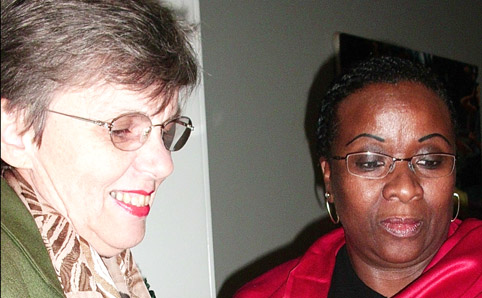 |
| Prof. JJE Messerschimdt (left) is the main supervisor and Dr KE Khabanyane the co-supervisor of this study within our Faculty of Education. |
The implementation of Curriculum 2005 brought about new demands in the teaching and learning of languages. In teaching languages, it is expected of teachers to focus on the development of the basic language skills which are embedded in the first four outcomes, namely listening, speaking and reading which is coupled with viewing and writing.
Although the learning outcomes are developed as an integrated whole, each one needs special attention. According to the NCS, the third learning outcome namely "reading and viewing", is stated as follows: "The learner will be able to read and view for information and enjoyment, and respond critically to the aesthetic, cultural and emotional value in texts".
Julia Ramabenyane researches The facilitative role of Grade 1 teachers in the development of reading skills in Sesotho. Empowering teachers: Working with head, heart and hand, a workshop for Grade 1 teachers, was held on 27 and 28 May in the Winkie Direko Building on our Main Campus. The aim of the workshop was to create an opportunity for teachers to better understand their role as facilitators in the development of reading skills.
In addition to the facilitation of Mrs Ramabenyane, Prof. Hasina Ebrahim (lecturer at the School of Social Sciences and Language Education), grade 1 teachers from Lesedi and Karabelo Primary Schools, as well as the HOD of Foundation Phase and three grade 1 learners from Karabelo Primary School in Rocklands, participated in the activities.
This workshop, together with other reflective group sessions, formed part of the emancipatory action research of Julia Ramabenyane's Foundation Phase PhD studies. This PhD study is titled The facilitative role of grade 1 teachers in development of readings skills in Sesotho.